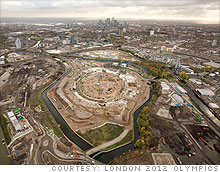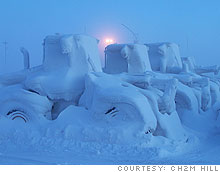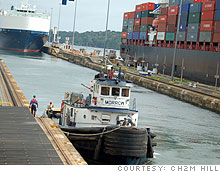A big new world to engineer
Recession aside, a growing population will trigger lots more construction. How a big-dreaming firm from Colorado is winning a major piece of the action.
 |
| London's Olympic stadium will be built to seat 80,000 for the games, then downsized to 25,000 for community use. |
 |
| CH2M is helping find oil in the arctic. |
 |
| The company's project will allow larger ships to get through the Panama Canal. |
(Fortune Magazine) -- We can't say with certainty what the world will look like 20 years from now, but experts are pretty sure about this: Population will grow from today's 6.8 billion to about 8 billion, over 5 billion people will live in cities, and they'll be buying more things, driving more cars, flying more often, throwing away more garbage, and using more power.
That will stress energy and water supplies, pump more greenhouse gases into the atmosphere - and create a vast array of business opportunities for an unusual Colorado-based engineering firm with an equally unusual name: CH2M Hill.
CH2M Hill gets big things built. The company, which arrived on the Fortune 500 list for the first time this year (with 2008 revenues of $5.6 billion, it ranks No. 436), manages engineering, construction, and operations projects on every continent but Antarctica. Among them are three of the world's most visible: the $5.3 billion expansion of the Panama Canal, the $14 billion development of the 2012 London Olympics, and the $22 billion construction of Masdar in Abu Dhabi, the world's first zero-carbon city.
The Colorado firm has become a go-to specialist around the world in water projects (Singapore's new wastewater system), polar logistics (the National Science Foundation's research projects in Greenland), and radioactive-materials handling (the cleanup of the Energy Department's nuclear-waste stockpile in Hanford, Wash.).
In the private sector CH2M Hill designs everything from power plants to factories, including a detergent plant for Procter & Gamble (PG, Fortune 500) in Louisiana, a fighter plane assembly plant for Lockheed Martin (LMT, Fortune 500) in Georgia and a Nike (NKE, Fortune 500) shoe factory in Vietnam.
Despite the recession's toll on construction spending, CH2M Hill expects to grow this year. Lee McIntire, a 60-year-old civil engineer who became CEO in January, told Fortune, "We have the largest backlog we've ever had." The company has about 10,000 projects underway. While it laid off several hundred employees last fall because of the slowing economy, the firm expects to hire about 1,800 new ones this year. McIntire, a genial native of Nebraska with a resemblance to actor Bob Newhart, writes a folksy blog for employees, dispensing his thoughts on where the business is headed. "We are doing fine in tough times getting ourselves fit for when the world expands again," he blogged recently. "So far, it always has."
How did this low-key company rise up to challenge such Fortune 500 engineering and construction giants as Fluor (FLR, Fortune 500) (No. 114) and KBR (KBR, Fortune 500) (No. 234)? Its executives point to a corporate culture that fosters a deep commitment among employees, as well as a set of values codified in a pamphlet called the Little Yellow Book, written by one of the founders nearly three decades ago, which champions an egalitarian philosophy ("Rules are for everyone," "Excessive perks trap the receiver").
What began in 1946 as a partnership of four engineers - an Oregon State University professor and three of his students, with the initials C, H, H, and M (Hill came later) - has grown into a company that is owned by about 14,000 of its 26,000 employees, enough shareholders to make it subject to SEC rules. Ownership has its rewards. The stock is traded quarterly on an internal market; over the past five years the stock has risen from $12.07 to $32.54 a share, an annual return of 22%.
One of the firm's greatest coups was winning the contract to manage the expansion of the Panama Canal. Ninety five years after it opened in 1914, the 50-mile-long path between the seas is showing signs of age. Traffic jams plague shippers, while big container vessels, known as post-Panamax ships, can't squeeze through the 110-foot-wide locks; instead they haul goods from Asia to America's East Coast through the bigger Suez Canal.
With the Panama Canal authority, CH2M Hill is, in essence, managing the construction of a second canal so that today's larger ships can travel through more easily. The job requires moving a lot of dirt - roughly 130 million cubic meters of rock and soil, enough to fill the Empire State Building nearly 13 times. It also requires careful stewardship of water, since about 52 million gallons of fresh water from a man-made lake flow out into the ocean each time a ship passes through. The new locks recycle much of that water instead. If all goes well, the first post-Panamax vessel will transit the expanded canal in 2014.
Big contracts on that scale take a year or more to award, require proposals that run thousands of pages (sometimes an entire truck is rented to deliver them), and involve numerous meetings between the bidders and the client. CH2M Hill says the decision often comes down to intangibles like reputation and compatibility.
"A lot of organizations around the world are technically qualified," says Jacques Rast, the company's group chief executive for major programs. "The clients want a partner they can trust, who won't take over their project." In Panama sensitivities linger because the U.S. owned and operated the canal from 1914 to 1999. "You know what they really cared about?" Rast asks. "That we leave the Panamanian engineering and construction community stronger than when we got there." So the company promised to send in Spanish-speaking executives, provide management training, and hire lots of local staff.
Even after landing a big job, there's no time to celebrate: A major new assignment typically means mobilizing a global team of executives to get to work on the project site, often within weeks. "We'll have a glass of champagne," says Rast, "but you can only have one because you have to go home and pack."
The impact of CH2M Hill's projects is usually felt for decades - even one designed for a short-term event, like the London Olympics in 2012. London promised to make these Olympics the most sustainable ever by building energy-efficient facilities, dramatically reducing waste, erecting a wind turbine on the site, and designing 50 miles of walking and bike paths.
Plans call for the 80,000-seat Olympic stadium to be downsized after the Games to a 25,000-seat facility for community use. The Olympics are being built on industrial land that was badly degraded and highly polluted - "one of the nastiest environmental-remediation sites in London," Rast says. More than 90% of the waste materials arising from demolition are being reused or recycled: About 1.3 million metric tons of soil are being cleaned by on-site machines, and 50,000 metric tons have been cleaned up using natural microorganisms. About 4,000 newts and toads have been relocated to a wildlife habitat on the grounds. "We are building this incredible infrastructure as green as we can," McIntire says.
The company's expertise with water has driven its global expansion, beginning with water projects in poor countries, financed by the U.S. Agency for International Development. Today CH2M Hill is managing big projects in Singapore, the United Arab Emirates, and Australia. "Climate change is for real, and Australia has experienced significant drought conditions to where the reservoirs were down to 20% to 30% of capacity," says Tom Searle, president of CH2M Hill International. "That's catastrophic."
A Singapore plant designed by the firm treats wastewater to a level of purity that would let it be sold as bottled water. All the executives at CH2M Hill see the world's environmental problems as a big opportunity. Urbanization will require vast spending on water, sewers, trains, and airports. "The Third World wants to become the First World," Searle says. "People as they get richer won't tolerate pollution."
Will success turn CH2M Hill into just another multinational company? Not if the Little Yellow Book and its golden-rule values are any guide. And the fact that the employees control the stock creates a sense of shared purpose, says Mark Lasswell, a CH2M Hill executive whose father was the firm's 11th employee. "We've got 26,000 people who think they have their own little company that's part of a big company," he says. "We trust them to do the right thing."
CEO McIntire says CH2M Hill has no plans to raise capital on the public markets. "I look at my competitors. I don't envy them," he says. He can focus on doing his job and pleasing customers. "No analysts. No short-selling. There's nobody in New York who runs this company. It's actually us."
The Fortune 500 is now a year-round series. In this installment we profile a company on the list for the first time. Watch for future 500 Series stories on America's industry leaders. ![]()
-
 The retail giant tops the Fortune 500 for the second year in a row. Who else made the list? More
The retail giant tops the Fortune 500 for the second year in a row. Who else made the list? More -
 This group of companies is all about social networking to connect with their customers. More
This group of companies is all about social networking to connect with their customers. More -
 The fight over the cholesterol medication is keeping a generic version from hitting the market. More
The fight over the cholesterol medication is keeping a generic version from hitting the market. More -
 Bin Laden may be dead, but the terrorist group he led doesn't need his money. More
Bin Laden may be dead, but the terrorist group he led doesn't need his money. More -
 U.S. real estate might be a mess, but in other parts of the world, home prices are jumping. More
U.S. real estate might be a mess, but in other parts of the world, home prices are jumping. More -
 Libya's output is a fraction of global production, but it's crucial to the nation's economy. More
Libya's output is a fraction of global production, but it's crucial to the nation's economy. More -
 Once rates start to rise, things could get ugly fast for our neighbors to the north. More
Once rates start to rise, things could get ugly fast for our neighbors to the north. More







